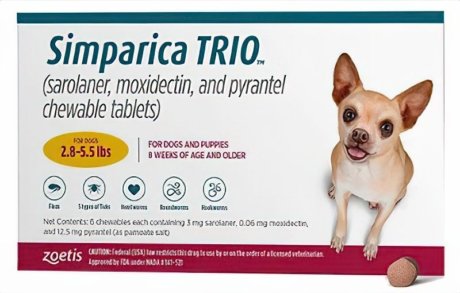Rimadyl : A Comprehensive Guide to Canine Pain Relief
Caring for your dog’s well-being is essential, and Rimadyl is here to help. This NSAID, also known as Carprofen, offers effective pain and inflammation relief for your furry friend. In this guide, we’ll explore the ins and outs of Rimadyl, from its uses to dosages, ensuring your dog’s comfort and happiness.
What is Rimadyl?
Rimadyl, also known by its generic name Carprofen, is a non-steroidal anti-inflammatory drug (NSAID) specifically designed for dogs. It effectively reduces pain and inflammation by inhibiting the production of prostaglandins, which are inflammatory chemicals in the body.

Rimadyl provides a critical tool in veterinary medicine for managing a range of conditions that cause discomfort and pain in dogs.
Rimadyl For Dogs
Rimadyl is a brand name for the medication carprofen, which is a non-steroidal anti-inflammatory drug (NSAID) commonly prescribed for dogs. It is primarily used to relieve pain and reduce inflammation associated with various conditions, particularly those affecting a dog’s musculoskeletal system. Here’s what you need to know about Rimadyl for dogs:
1. Pain Relief:
- Rimadyl is often prescribed to manage pain in dogs caused by conditions such as osteoarthritis, hip dysplasia, post-operative discomfort, and injuries. It helps alleviate pain by reducing inflammation and blocking pain signals.
2. Anti-Inflammatory Properties:
- As an NSAID, Rimadyl has anti-inflammatory properties, making it effective at reducing swelling and inflammation in dogs with joint issues or other inflammatory conditions.
3. Arthritis Management:
- Rimadyl is frequently used in the long-term management of arthritis in dogs. It can help improve mobility and comfort for dogs suffering from this degenerative joint disease.
4. Different Formulations:
- Rimadyl is available in various formulations, including chewable tablets, caplets, and injectable forms, making it convenient for different administration preferences and the specific needs of the dog.
5. Prescription Medication:
- Rimadyl is a prescription medication, which means it can only be obtained with a valid prescription from a licensed veterinarian. Your veterinarian will determine the appropriate dosage and duration of treatment based on your dog’s condition and individual characteristics.
6. Dosage and Administration:
- The dosage of Rimadyl prescribed for your dog will depend on factors such as their weight, the severity of the condition, and the specific formulation used. It’s crucial to follow your veterinarian’s dosing instructions precisely.
7. Monitoring and Potential Side Effects:
- While Rimadyl can be highly effective, it is essential to monitor your dog for any potential side effects, including gastrointestinal issues (such as vomiting or diarrhea), changes in appetite, or signs of discomfort.
- Some dogs may experience side effects, and it’s crucial to consult your veterinarian if you observe any concerning symptoms.
8. Precautions:
- Rimadyl should be used with caution in dogs with a history of gastrointestinal problems, liver or kidney disease, or bleeding disorders.
- It should not be used in dogs known to be hypersensitive to carprofen or other NSAIDs.
- Always inform your veterinarian about any other medications or supplements your dog is taking to avoid potential interactions.
9. Regular Check-Ups:
- Dogs on long-term Rimadyl treatment may require periodic check-ups and blood tests to monitor their health and ensure the medication’s continued safety and effectiveness.
Rimadyl For Humans
Rimadyl, also known by its generic name carprofen, is a non-steroidal anti-inflammatory drug (NSAID) primarily prescribed for dogs to manage pain and inflammation associated with conditions like arthritis, musculoskeletal injuries, and post-operative discomfort. It is not intended for use in humans.
While NSAIDs like carprofen are commonly used in veterinary medicine, they are not approved for human use. Rimadyl is specifically formulated and dosed for dogs and is not suitable or safe for human consumption. Using veterinary medications, including Rimadyl, in humans is strongly discouraged and can lead to serious health risks and adverse effects.
If you have concerns about pain or inflammation in your own health or a family member’s health, it is essential to consult with a medical professional. They can recommend appropriate medications and treatments that are approved and safe for human use, as well as provide guidance on managing specific medical conditions.
Never attempt to self-medicate with veterinary medications or use medications prescribed for animals in humans, as this can have severe consequences for your health. Always follow the advice and prescriptions of healthcare providers when seeking treatment for human health issues.
Rimadyl 25mg for Dogs:
Rimadyl 25mg is a specific dosage strength of the medication carprofen, commonly prescribed for dogs. Here’s what you need to know about it:
- Strength: A Rimadyl 25mg tablet contains 25 milligrams of the active ingredient, carprofen.
- Usage: This strength is typically prescribed for smaller dogs or for dogs with milder pain and inflammation.
- Pain Relief: Rimadyl is used to alleviate pain in dogs caused by conditions like osteoarthritis, hip dysplasia, post-operative discomfort, and injuries.
- Anti-Inflammatory Properties: It has anti-inflammatory properties and can reduce inflammation in dogs with joint issues or other inflammatory conditions.
- Prescription Medication: Rimadyl is a prescription medication, and the dosage and duration of treatment should be determined by a licensed veterinarian.
- Dosage and Administration: The dosage of Rimadyl for your dog will depend on factors such as their weight, condition, and the veterinarian’s recommendations. Rimadyl 25mg tablets are typically administered orally.
- Monitoring: It’s important to monitor your dog for potential side effects while on Rimadyl, including gastrointestinal issues, changes in appetite, or discomfort.
Rimadyl 75mg for Dogs:
Rimadyl 75mg is another dosage strength of the medication carprofen used for dogs. Here are the key points:
- Strength: A Rimadyl 75mg tablet contains 75 milligrams of carprofen.
- Usage: This strength is often prescribed for medium to large-sized dogs or for dogs with moderate pain and inflammation.
- Pain Relief: Rimadyl is used to manage pain in dogs associated with conditions such as arthritis, hip dysplasia, and post-operative recovery.
- Anti-Inflammatory Properties: It effectively reduces inflammation, improving mobility and comfort in dogs with joint problems.
- Prescription Medication: Rimadyl is available only by prescription and should be administered according to your veterinarian’s guidance.
- Dosage and Administration: Your veterinarian will determine the appropriate dosage based on your dog’s weight and specific condition. Rimadyl 75mg tablets are typically given orally.
- Monitoring: Regular monitoring for potential side effects is essential when using Rimadyl.

Rimadyl 100mg:
Rimadyl 100mg is a higher dosage strength of carprofen used in dogs. Here are the details:
- Strength: A Rimadyl 100mg tablet contains 100 milligrams of carprofen.
- Usage: This strength is typically reserved for larger dogs or for dogs with more severe pain and inflammation.
- Pain Relief: Rimadyl is effective at managing pain in dogs, especially those with advanced joint issues or following major surgeries.
- Anti-Inflammatory Properties: It has potent anti-inflammatory properties, reducing swelling and discomfort.
- Prescription Medication: Rimadyl is a prescription medication, and the dosage should be determined by a licensed veterinarian.
- Dosage and Administration: The specific dosage of Rimadyl 100mg for your dog will be based on their weight and condition, as determined by your veterinarian. Administration is typically oral.
- Monitoring: Due to the higher dosage, vigilant monitoring for potential side effects is crucial when using Rimadyl 100mg.
Rimadyl Dosing Chart
Here’s a Rimadyl dosing chart for dogs based on weight:
| Dog’s Weight (in pounds) | Rimadyl Dosage (in milligrams) |
|---|---|
| Up to 10 lbs | 12.5 mg |
| 11-20 lbs | 25 mg |
| 21-30 lbs | 37.5 mg |
| 31-40 lbs | 50 mg |
| 41-50 lbs | 62.5 mg |
| 51-60 lbs | 75 mg |
| 61-70 lbs | 87.5 mg |
| 71-80 lbs | 100 mg |
| 81-90 lbs | 112.5 mg |
| 91-100 lbs | 125 mg |
| Over 100 lbs | Consult your veterinarian for the appropriate dosage. |
Uses of Rimadyl

1. Arthritis Management
Rimadyl is a pivotal medication in the management of arthritis in dogs. Arthritis is a common ailment, especially in older dogs, and it can significantly impact their quality of life. Rimadyl helps by reducing joint pain, enhancing mobility, and minimizing stiffness. This means that even arthritic dogs can lead a more active and comfortable life, running and playing without the constant discomfort.
2. Post-Surgery Pain Relief
After surgical procedures, it’s common for dogs to experience post-operative pain and inflammation. Rimadyl plays a crucial role in facilitating a smoother and less painful recovery process. By reducing pain and swelling, it allows dogs to heal more comfortably, ensuring a quicker return to their normal activities.
3. Pain Management for Injuries
Dogs are active and curious animals, which can sometimes lead to accidents and injuries. When dogs experience injuries like strains or sprains, Rimadyl comes to the rescue. It helps reduce swelling and discomfort, expediting the healing process. This means your furry friend can be back on their paws and enjoying their favorite activities sooner.
4. Dental Procedures
Dental health is vital for a dog’s overall well-being. During dental procedures, dogs may experience oral pain and inflammation. Rimadyl is often recommended by veterinarians to ease this discomfort during the recovery period. This ensures that dogs can continue to eat, drink, and play comfortably after dental treatments.
How Does Rimadyl Work?
Rimadyl’s mechanism of action involves inhibiting enzymes responsible for producing prostaglandins. Prostaglandins are hormone-like substances that play a significant role in inflammation and pain processes. By reducing prostaglandin levels, Rimadyl effectively diminishes inflammation and provides pain relief, improving a dog’s overall comfort.
Benefits of Rimadyl
Rimadyl offers several key benefits:
- Swift and Effective Pain Relief: Rimadyl provides rapid pain relief, which can greatly enhance a dog’s quality of life, especially when dealing with conditions like arthritis or post-surgery discomfort.
- Reduction in Inflammation and Swelling: Inflammation is a common source of pain in many conditions. Rimadyl not only relieves pain but also reduces inflammation and swelling, further enhancing a dog’s comfort.
- Various Forms for Convenient Administration: Rimadyl is available in various forms, including chewable tablets and caplets, making it easy to administer according to your dog’s preferences and needs.
- Suitable for Long-term Pain Management Plans: For dogs with chronic conditions, Rimadyl can be used as part of a long-term pain management plan, ensuring sustained comfort.
Dosage and Administration
The dosage and administration of Rimadyl are highly individualized and depend on factors such as a dog’s weight, age, and specific medical condition. Veterinarians provide precise instructions to ensure the pet’s safety and comfort. It’s crucial for pet owners to strictly adhere to these instructions to achieve the desired therapeutic effects while minimizing the risk of side effects.
Possible Side Effects of Rimadyl
While Rimadyl is generally well-tolerated, some dogs may experience side effects. It’s essential for pet owners to be aware of these potential side effects, which may include:
- Gastrointestinal Upset: Some dogs may experience gastrointestinal upset, which can manifest as vomiting or diarrhea. If this occurs, it’s advisable to consult a veterinarian for guidance.
- Decreased Appetite: Rimadyl may cause a decrease in appetite in some dogs. Encouraging your dog to eat by offering tasty, easy-to-digest meals can help address this issue. If appetite loss persists, consult with your veterinarian.
- Increased Thirst and Urination: Some dogs may exhibit increased thirst and urination while on Rimadyl. It’s crucial to ensure that your dog has access to fresh water at all times to prevent dehydration. If this issue continues, consult your veterinarian.
- Behavioral Changes: While less common, Rimadyl can cause behavioral changes in some dogs, such as restlessness or increased anxiety. It’s essential to monitor your dog closely for any unusual behaviors and consult your veterinarian if they persist or worsen.
Precautions of Rimadyl
When using Rimadyl, it’s important to take certain precautions to ensure your dog’s safety and well-being:
- Veterinary Supervision: Rimadyl should only be administered under the guidance of a licensed veterinarian who can evaluate your dog’s specific needs and prescribe the appropriate dosage.
- Avoid Use in Other Animals: Never give Rimadyl to cats or other animals without veterinary approval. It is specifically formulated for dogs and can be harmful to other species.
- Maintain Hydration: Ensure that your dog remains well-hydrated while taking Rimadyl, especially if they are experiencing increased thirst due to the medication.
- Regular Monitoring: Keep a close eye on your dog for any adverse reactions or changes in behavior while they are on Rimadyl. Promptly report any concerns to your veterinarian.
Alternatives to Rimadyl
While Rimadyl is highly effective for many dogs, there are alternative pain relief medications available. If Rimadyl isn’t suitable for your dog or if they experience adverse effects, veterinarians may recommend alternative options. These alternatives can include medications like Gabapentin, Tramadol, or natural supplements. Consult with your veterinarian to determine the best option for your pet’s specific needs.
Rimadyl vs. Other Pain Medications
When considering pain management for your dog, it’s important to discuss your dog’s specific condition and medical history with your veterinarian. They can help you make an informed decision regarding which medication, including Rimadyl or others, is the most appropriate and effective for your dog’s well-being. Each medication has its unique mechanisms of action and potential benefits, and your veterinarian can tailor the treatment plan to your dog’s individual needs.

Rimadyl for Aging Dogs
Aging dogs often encounter various health challenges, including joint pain and arthritis. Rimadyl plays a pivotal role in enhancing their quality of life during their golden years. It reduces stiffness and pain, allowing older dogs to move more comfortably and partake in daily activities they may have struggled with otherwise.
Rimadyl for Canine Osteoarthritis
Canine osteoarthritis is a common ailment, particularly among senior dogs. Rimadyl offers substantial relief from the pain and stiffness associated with this condition. By reducing inflammation in the joints, it enables your furry friend to enjoy a more comfortable and active life, even with osteoarthritis.
Rimadyl for Post-Surgical Pain Management
After surgery, dogs often experience pain, discomfort, and inflammation. This is where Rimadyl steps in to aid in their recovery. It helps reduce post-operative pain, ensuring a smoother healing process. Your veterinarian may prescribe Rimadyl to make the post-surgery phase less stressful for your dog.
Rimadyl vs. Gabapentin: Choosing the Right Medication
Selecting the appropriate pain relief medication for your dog is essential. When comparing Rimadyl and Gabapentin, it’s crucial to consider the specific condition and your dog’s needs. Rimadyl primarily reduces inflammation, while Gabapentin targets nerve-related pain. Consult with your vet to make an informed decision based on your dog’s unique situation.
Rimadyl vs. Tramadol: A Comparative Analysis
Rimadyl and Tramadol are both effective pain medications, but they operate differently. Rimadyl is an NSAID that reduces inflammation, while Tramadol is an opioid analgesic that manages pain signals in the brain. Understanding the differences and similarities between these options can help you and your veterinarian decide which is more suitable for your dog’s pain management.
Rimadyl vs. Natural Remedies: Which Is Better?
The choice between Rimadyl and natural remedies like glucosamine and chondroitin can be challenging. Rimadyl offers swift pain relief and reduces inflammation, while natural remedies tend to focus on long-term joint health. The decision should align with your dog’s specific condition, and consulting your vet can provide valuable guidance.
Carprofen vs Rimadyl:
Comparision and differences between Carprofen vs Rimadyl:
| Aspect | Carprofen | Rimadyl |
|---|---|---|
| Generic Name | Carprofen | Carprofen |
| Brand Name | Carprofen is the generic name; various brand names available. | Rimadyl is a common brand name for carprofen. |
| Type of Medication | Non-Steroidal Anti-Inflammatory Drug (NSAID) | Non-Steroidal Anti-Inflammatory Drug (NSAID) |
| Primary Use | Pain relief and inflammation reduction in dogs, often for musculoskeletal conditions and post-surgery. | Pain relief and inflammation reduction in dogs, often for musculoskeletal conditions and post-surgery. |
| Mechanism of Action | Inhibits enzymes responsible for inflammation (COX-1 and COX-2). | Inhibits enzymes responsible for inflammation (COX-1 and COX-2). |
| Prescription Required | Yes | Yes |
| Available Forms | Tablets, chewable tablets, caplets, and injectable formulations. | Tablets, chewable tablets, caplets, and injectable formulations. |
| Dosage and Administration | Dosage varies based on the dog’s weight and condition. Administer orally. | Dosage varies based on the dog’s weight and condition. Administer orally. |
| Potential Side Effects | Gastrointestinal upset, changes in appetite, vomiting, diarrhea. | Gastrointestinal upset, changes in appetite, vomiting, diarrhea. |
| Suitability for Dogs | Suitable for dogs with musculoskeletal pain and inflammation. | Suitable for dogs with musculoskeletal pain and inflammation. |
| Monitoring | Regular monitoring for side effects and response to treatment is recommended. | Regular monitoring for side effects and response to treatment is recommended. |
| Special Considerations | – Should not be used in dogs with known hypersensitivity to carprofen. | – Should not be used in dogs with known hypersensitivity to carprofen. |
| – Use with caution in dogs with a history of gastrointestinal issues, liver or kidney problems, or bleeding disorders. | – Use with caution in dogs with a history of gastrointestinal issues, liver or kidney problems, or bleeding disorders. | |
| Notes | Carprofen is the generic name, and various brand names are available from different manufacturers. | Rimadyl is a common brand name for carprofen, often used interchangeably. |
Galliprant vs Rimadyl:
Comparision and differences between Galliprant vs Rimadyl:
| Aspect | Galliprant | Rimadyl |
|---|---|---|
| Generic Name | Grapiprant | Carprofen |
| Brand Name | Galliprant is the generic name; Galliprant is the brand name. | Rimadyl is a common brand name for carprofen. |
| Type of Medication | Non-Steroidal Anti-Inflammatory Drug (NSAID) | Non-Steroidal Anti-Inflammatory Drug (NSAID) |
| Primary Use | Pain relief and inflammation reduction in dogs, often for osteoarthritis. | Pain relief and inflammation reduction in dogs, often for musculoskeletal conditions and post-surgery. |
| Mechanism of Action | Targets a specific receptor (EP4) involved in the inflammatory process. | Inhibits enzymes responsible for inflammation (COX-1 and COX-2). |
| Prescription Required | Yes | Yes |
| Available Forms | Tablets | Tablets, chewable tablets, caplets, and injectable formulations. |
| Dosage and Administration | Dosage varies based on the dog’s weight and condition. Administer orally. | Dosage varies based on the dog’s weight and condition. Administer orally. |
| Potential Side Effects | Gastrointestinal upset, changes in appetite, vomiting, diarrhea. | Gastrointestinal upset, changes in appetite, vomiting, diarrhea. |
| Suitability for Dogs | Suitable for dogs with osteoarthritis and musculoskeletal pain. | Suitable for dogs with musculoskeletal pain and inflammation. |
| Monitoring | Regular monitoring for side effects and response to treatment is recommended. | Regular monitoring for side effects and response to treatment is recommended. |
| Special Considerations | – Should not be used in dogs with known hypersensitivity to grapiprant. | – Should not be used in dogs with known hypersensitivity to carprofen. |
| – Generally considered safer for the gastrointestinal system compared to traditional NSAIDs like carprofen. | – Use with caution in dogs with a history of gastrointestinal issues, liver or kidney problems, or bleeding disorders. | |
| Notes | Galliprant is a newer NSAID with a more targeted mechanism of action compared to traditional NSAIDs like carprofen. | Rimadyl is a common brand name for carprofen, often used interchangeably. |
Does Rimadyl Make Dogs Sleepy:
Rimadyl (carprofen) is primarily a non-steroidal anti-inflammatory drug (NSAID) used to manage pain and inflammation in dogs. While drowsiness or sleepiness is not a commonly reported side effect of Rimadyl, individual dog reactions to medications can vary.

Some dogs may appear more lethargic or sleepy while taking Rimadyl, but this is not the typical response. If you notice unusual changes in your dog’s behavior, including increased sleepiness, it’s essential to consult with your veterinarian. They can assess your dog’s overall health and determine whether Rimadyl is the cause or if there may be other underlying factors.
Is Carprofen The Same As Rimadyl:
Carprofen is the generic name of the medication, while Rimadyl is a brand name of a specific carprofen product. In essence, both Carprofen and Rimadyl contain the same active ingredient, which is carprofen. They are used for the same purposes, such as managing pain and inflammation in dogs, and have the same mechanism of action.
The primary difference between them is the brand name and potentially the specific formulation or manufacturer. Some veterinarians may use the term “carprofen” generically to refer to the medication, while others may prescribe a specific brand, like Rimadyl or other brands such as Novox or Quellin, which also contain carprofen. Regardless of the brand, the active ingredient remains carprofen.
Carprofen Novox or Rimadyl:
Novox and Rimadyl are both brand names of carprofen, a non-steroidal anti-inflammatory drug (NSAID) commonly used in dogs for pain relief and inflammation management. Here are some key considerations:
- Active Ingredient: Both Novox and Rimadyl contain carprofen as the active ingredient. They work in the same way to reduce pain and inflammation.
- Brand Name: Novox and Rimadyl are simply different brand names for the same medication. They are equivalent in terms of their active ingredient and intended use.
- Formulations: Both Novox and Rimadyl are available in various formulations, including chewable tablets, caplets, and injectable forms. The specific formulation may depend on your veterinarian’s recommendation and your dog’s needs.
- Prescription: Both Novox and Rimadyl are prescription medications. You can only obtain them with a valid prescription from a licensed veterinarian.
- Safety and Monitoring: Like all NSAIDs, both Novox and Rimadyl can have potential side effects, especially if not used according to your veterinarian’s instructions. Regular monitoring for side effects and response to treatment is recommended.
The choice between Novox and Rimadyl often comes down to your veterinarian’s familiarity with the product, availability, and your dog’s individual needs. Both are effective in managing pain and inflammation, but the specific brand and formulation may vary based on your dog’s condition and your veterinarian’s preference. Always follow your veterinarian’s guidance regarding the use of these medications for your dog’s well-being.
Long-term Use of Rimadyl: Safety and Efficacy
Many dogs require ongoing pain management, and Rimadyl can be a viable option for long-term use. It’s essential to address safety concerns and efficacy when considering extended usage. Regular veterinary check-ups, including blood tests to monitor liver and kidney function, are crucial to ensure your dog’s well-being while on long-term Rimadyl treatment.
How to Administer Rimadyl to Your Dog
Administering medication to your dog can sometimes be challenging. To ensure your pet takes Rimadyl without any issues, consider these tips:
- Hide in Treats: Conceal the medication in a treat or soft food to make it more appealing.
- Crushing Tablets: If your dog refuses to swallow tablets, ask your veterinarian if it’s safe to crush them and mix them with food.
- Follow Vet Instructions: Always adhere to your veterinarian’s administration instructions, including dosage and frequency.
- Monitoring: Keep an eye on your dog to ensure they consume the entire dose and don’t spit it out.
Tips for Managing Side Effects
While Rimadyl is generally well-tolerated, some dogs may experience side effects. Here are tips for managing common side effects:
- Gastrointestinal Upset: If your dog experiences vomiting or diarrhea, consult your vet. They may recommend adjusting the dose, administering with food, or switching medications if necessary.
- Loss of Appetite: Encourage eating by offering tasty, easy-to-digest meals. Consult with your vet if the appetite loss persists.
- Increased Thirst and Urination: Ensure your dog has access to fresh water at all times. If the issue continues, consult your vet.
- Behavioral Changes: Monitor your dog closely for any unusual behavior changes. If they become anxious or agitated, consult your vet for possible adjustments to the medication.
Rimadyl and Canine Behavior: What to Watch For
While Rimadyl is primarily used for pain management, some dogs may exhibit changes in behavior when taking the medication. Common behavioral changes include restlessness, increased anxiety, or lethargy. It’s essential to monitor your dog and discuss any concerns with your veterinarian to ensure their well-being while on Rimadyl.
Case Studies: Success Stories with Rimadyl
Real-life examples of dogs benefiting from Rimadyl can provide valuable insights into its effectiveness. These case studies illustrate how Rimadyl has improved the lives of dogs, making it easier to understand its positive impact on canine pain management.

The Role of Diet in Maximizing Rimadyl’s Benefits
Diet can significantly influence the effectiveness of Rimadyl in managing pain and inflammation. To optimize the benefits of Rimadyl, consider the following dietary factors:
- Weight Management: Maintaining a healthy weight reduces stress on joints, complementing the effects of Rimadyl.
- Omega-3 Fatty Acids: Omega-3 supplements can have anti-inflammatory effects, potentially enhancing Rimadyl’s benefits.
- Prescription Diets: Specialized prescription diets designed for joint health can be recommended by your veterinarian.
Rimadyl for Canine Cancer Pain
Cancer in dogs can be an incredibly challenging and painful condition. Rimadyl can offer relief from cancer-related pain, making your dog more comfortable during this difficult time. Consult with your vet to determine the most appropriate pain management plan for your pet’s specific cancer diagnosis.
Exploring Rimadyl’s Mechanism of Action
Delving deeper into the science behind Rimadyl’s mechanism of action can help you better understand how it works in your dog’s body. Rimadyl inhibits the production of prostaglandins, reducing inflammation and pain. This targeted approach makes it an effective choice for various pain conditions.
The Evolution of Pain Management in Veterinary Medicine
The history of pain management in veterinary medicine has witnessed remarkable advancements. Understanding how the field has evolved can provide insight into the effectiveness and importance of medications like Rimadyl in improving the quality of life for dogs.
The Science Behind NSAIDs: Understanding the Chemistry
Non-steroidal anti-inflammatory drugs (NSAIDs), including Rimadyl, have a complex chemistry. Grasping the science behind these medications can help you appreciate their role in managing pain and inflammation in dogs more fully.
Rimadyl for Small Breeds vs. Large Breeds: Considerations
The appropriate dosage of Rimadyl can vary between small and large dog breeds. Smaller dogs may require a lower dose, while larger breeds may need a higher one. It’s crucial to consult with your veterinarian to determine the correct dosage based on your dog’s size and condition.
Over-the-Counter Pain Relief vs. Prescription Medications
Understanding the differences between over-the-counter (OTC) pain relief options and prescription medications like Rimadyl is essential. While OTC options can provide some relief, prescription medications like Rimadyl are specifically designed for more severe pain and inflammation. Consulting your veterinarian will help determine the most suitable choice for your dog.
Combining Rimadyl with Physical Therapy: A Holistic Approach
A holistic approach to pain management often involves combining Rimadyl with physical therapy. Physical therapy can complement Rimadyl’s effects by improving joint mobility, strength, and overall well-being. Consult with your veterinarian to explore the potential benefits of this approach for your dog.
How to Choose a Veterinary Professional for Rimadyl Treatment
Selecting the right veterinary professional is crucial when considering Rimadyl treatment for your dog. Look for a vet who is experienced in pain management and has a comprehensive understanding of your dog’s specific condition. Effective communication and trust between you, your vet, and your dog’s healthcare team are essential.
Rimadyl for Chronic Pain Management
Chronic pain in dogs can be a daunting challenge, but Rimadyl can provide ongoing relief. By maintaining consistent pain management, you can significantly enhance your pet’s quality of life, ensuring they remain comfortable and happy despite their condition.
Rimadyl and Kidney Disease: Special Considerations
If your dog has kidney disease, special considerations are necessary when using Rimadyl. Kidney function should be monitored regularly to ensure the medication does not exacerbate any preexisting issues. Consult your veterinarian for guidance on using Rimadyl safely in dogs with kidney disease.
Rimadyl for Canine Hip Dysplasia
Hip dysplasia is a common condition in dogs, particularly in certain breeds. Rimadyl can provide relief from the pain and discomfort associated with hip dysplasia, enabling affected dogs to lead more comfortable lives. Discuss with your veterinarian how Rimadyl can be integrated into a comprehensive hip dysplasia management plan.
Rimadyl for Post-Traumatic Pain
After accidents or traumatic injuries, dogs may experience severe pain. Rimadyl can play a crucial role in providing swift pain relief and reducing inflammation, facilitating a smoother recovery process. Consult your veterinarian for guidance on using Rimadyl effectively in post-traumatic pain management.
Rimadyl and Canine Anxiety: The Connection
Pain and discomfort can exacerbate anxiety in dogs. Rimadyl’s ability to manage pain-related anxiety is an important aspect of its overall effectiveness. By providing relief from pain, Rimadyl can contribute to your dog’s emotional well-being and reduce anxiety levels.
The Impact of Rimadyl on Canine Life Expectancy
The long-term use of Rimadyl may raise questions about its potential impact on your dog’s overall life expectancy. While Rimadyl can significantly enhance your dog’s quality of life, it’s essential to consult with your veterinarian to understand any potential effects on lifespan based on your dog’s specific condition and treatment plan.
Rimadyl for Sporting and Working Dogs
Sporting and working dogs often face unique challenges due to their active lifestyles. Rimadyl can support their performance and well-being by managing pain and inflammation, allowing them to excel in their roles. Collaborate with your veterinarian to ensure your sporting or working dog receives the necessary pain management and care.
Rimadyl for Canine Seizure Management
Some dogs experience seizures, which can be a distressing condition. While Rimadyl is primarily a pain relief medication, it may be used alongside other medications in managing seizures. Consult your veterinarian to discuss the most appropriate treatment plan for your dog’s specific seizure condition.
Rimadyl and Liver Function: What You Need to Know
Understanding how Rimadyl may impact liver function is crucial for your dog’s well-being. Regular monitoring and communication with your veterinarian can help ensure that Rimadyl is used safely, particularly in dogs with preexisting liver conditions.
Managing Rimadyl Costs: Budget-Friendly Tips
Budget constraints can be a concern for pet owners. To manage the costs of Rimadyl treatment effectively, consider the following tips:
- Generic Options: Inquire with your vet if a generic version of Rimadyl is available, which can be more budget-friendly.
- Medication Coupons or Discounts: Look for manufacturer coupons or discounts offered by pharmacies to reduce medication costs.
- Insurance Coverage: Explore pet insurance options that may cover a portion of medication expenses.
Rimadyl for Acute Injuries: A Quick Guide
Swift action is crucial when addressing acute injuries in dogs. Rimadyl can provide rapid pain relief in emergency situations, allowing your dog to receive prompt care and treatment. Always consult with your veterinarian for guidance on administering Rimadyl in such cases.
Rimadyl for Chronic Joint Conditions: A Comprehensive Approach
Chronic joint conditions can be challenging to manage. A comprehensive approach that includes Rimadyl and other therapies can be highly effective. Collaborate closely with your veterinarian to develop a tailored plan for your dog’s long-term joint health and pain management.
Rimadyl and Canine Heart Health
Understanding the potential impact of Rimadyl on your dog’s heart health is essential. While Rimadyl primarily targets pain and inflammation, consult your veterinarian to ensure that it does not pose any risks to your dog’s cardiovascular well-being.
Rimadyl and Eye Conditions in Dogs
Eye conditions in dogs can be painful and distressing. Rimadyl may provide relief from associated pain and inflammation, contributing to your dog’s comfort during their recovery. Always consult with your veterinarian to determine the most appropriate treatment plan for eye-related issues.
Rimadyl for Preventative Joint Care
Proactive joint care is vital for preventing pain and discomfort in dogs. Rimadyl may be incorporated into your dog’s preventative healthcare routine to support joint health and reduce the risk of joint-related problems. Consult with your veterinarian to establish a suitable preventive plan.
Managing Rimadyl in Multi-Pet Households
If you have multiple pets, ensuring that the right pet receives the correct medication can be a challenge. Establish clear medication administration routines and consider using separate feeding areas to prevent mix-ups. Always consult your veterinarian if you have concerns about managing Rimadyl in a multi-pet household.
Rimadyl and Allergies: Identifying and Addressing Reactions
While allergic reactions to Rimadyl are rare, they can occur. Common signs of allergies include itching, hives, swelling, or difficulty breathing. If you suspect your dog is having an allergic reaction to Rimadyl, seek immediate veterinary attention to address the issue.
Rimadyl for Rescue Dogs: Special Considerations
Rescue dogs often come with unique medical histories and potential health issues. When using Rimadyl for rescue dogs, it’s crucial to consider their background and any preexisting conditions. Consult with your veterinarian to develop a suitable pain management plan that accounts for their unique needs.
Rimadyl for Working Dogs: Enhancing Performance
Working dogs, such as police dogs or search and rescue dogs, require peak physical performance. Rimadyl can support their physical well-being by managing pain and inflammation, allowing them to perform their duties effectively. Collaborate closely with your veterinarian to ensure your working dog receives the necessary pain management and care.
The Future of Canine Pain Management: Innovations and Breakthroughs
Staying informed about the latest innovations and breakthroughs in canine pain management is essential for providing the best possible care for your dog. This includes promising new treatments, therapies, and medications that may further enhance pain management options.
By now, you’ve acquired a comprehensive understanding of Rimadyl and its diverse applications in canine pain management. Prioritize your pet’s well-being, collaborate closely with your veterinarian, and make informed choices that enhance your dog’s comfort, happiness, and overall quality of life.
Conclusion:
In conclusion, Rimadyl stands as a versatile and valuable tool in canine pain management. Whether your beloved dog is a companion or a working partner, Rimadyl can significantly improve their quality of life by reducing pain, inflammation, and discomfort.
When considering Rimadyl, consult with your veterinarian to ensure it’s administered safely and effectively. Collaborative care, regular check-ups, and open communication will help tailor Rimadyl’s use to your dog’s specific needs, ensuring they remain comfortable and happy.
Frequently Asked Questions:
-
Is Rimadyl safe for long-term use in dogs?
Rimadyl can be used safely for extended periods when prescribed and monitored by a veterinarian. Regular check-ups and adjustments to the dosage, if needed, help ensure the pet’s safety.
-
Can I give Rimadyl to my cat?
No, Rimadyl is specifically formulated for dogs and should never be administered to cats or other animals without veterinary approval.
-
How quickly does Rimadyl start working?
Rimadyl typically begins to provide relief within a few hours of administration, effectively reducing pain and inflammation in dogs.
-
Are there any natural alternatives to Rimadyl?
While natural supplements like glucosamine and chondroitin can support joint health, they may not offer the same level of pain relief as Rimadyl. Consult with a vet for the most suitable approach to your dog’s specific condition.
-
Can I buy Rimadyl without a prescription?
No, Rimadyl is a prescription medication, and it should only be obtained through a licensed veterinarian who can assess your dog’s needs and prescribe the appropriate dosage.
Recommended:
Cerenia For Dogs: A Comprehensive Guide to Managing Canine Nausea





























